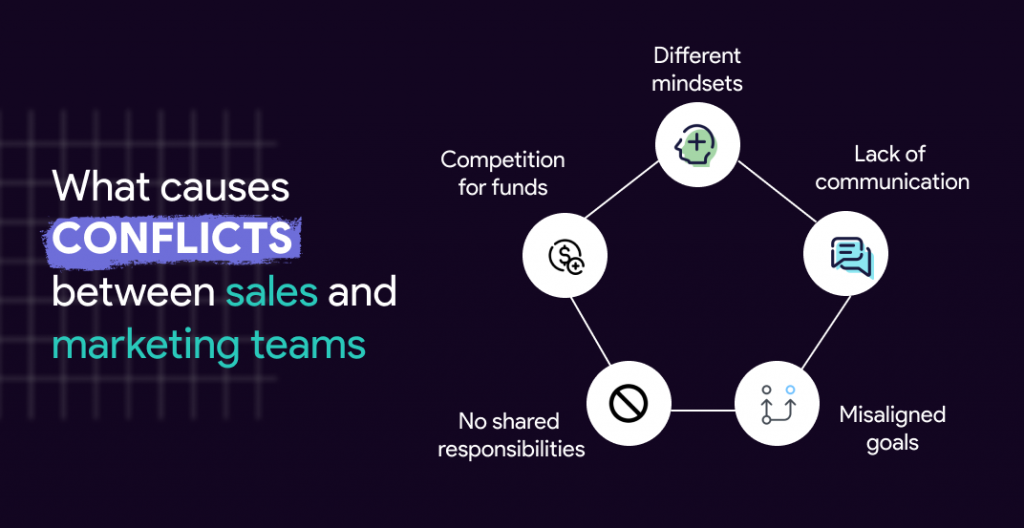
Why Do Sales and Marketing Teams Clash?
Table of Contents
In many organizations, sales and marketing teams often operate in silos. While both aim to increase revenue, their methods and objectives frequently diverge. This misalignment can lead to internal competition, communication breakdowns, and finger-pointing when goals aren’t met.
Common Reasons for Sales and Marketing Conflict:
- Lack of consistent communication
- Unclear or overlapping roles
- Conflicting KPIs and success metrics
- Budget-related disagreements
- Perceived value differences between the two teams

Although a degree of tension can drive innovation and performance, unchecked conflict can damage morale, lower productivity, and impact overall business outcomes.
The Impact of Poor Alignment
When marketing and sales aren’t aligned, it leads to:
- Reduced revenue and growth
- Misallocated resources
- Disconnected customer experiences
- Lower ROI on campaigns and sales activities
Both teams must understand and respect each other’s roles to create a harmonious and high-performing environment.
How to Resolve Sales and Marketing Conflicts
Effective alignment between sales and marketing requires strategy, transparency, and the right tools. Here are proven ways to close the gap between these two crucial teams:
1. Clearly Define Roles and Responsibilities
One of the most common causes of conflict is role ambiguity. Each team member should understand:
- What they’re responsible for
- Who they report to
- How their success is measured
Pro Tip: Use cross-functional training to help team members understand each other’s workflows and challenges.
2. Set Shared Goals and KPIs
Align your sales and marketing KPIs. Ensure both teams are accountable for shared objectives such as:
- Lead-to-customer conversion rate
- Customer acquisition cost (CAC)
- Revenue generated per campaign
Encourage collaboration instead of competition by rewarding both teams for joint performance.
3. Promote Transparent Communication
Establish weekly or bi-weekly sync-up meetings to review:
- Lead quality and feedback
- Campaign performance
- Market/customer insights
Use collaboration tools like Slack, Trello, or Microsoft Teams to keep everyone on the same page.

4. Build a Unified Sales and Marketing Plan
Sales and marketing must function as two halves of one unified system. Here’s a simplified alignment cycle:
- Marketing builds campaigns based on sales data.
- Marketing generates leads.
- Sales provides feedback on lead quality.
- Sales closes deals.
- Feedback from sales informs future marketing efforts.
This feedback loop ensures mutual success and stronger growth outcomes.
5. Share Knowledge and Resources
Use a shared knowledge base to store:
- Sales enablement materials
- Marketing analytics
- Customer personas
- Lead behavior data
With everyone accessing the same resources, communication becomes more efficient and data-driven decisions are easier to make.
6. Address Conflicts Early
Don’t wait for issues to escalate. As soon as you notice rising tension:
- Schedule a conflict resolution session.
- Use active listening and neutral language.
- Focus on facts and shared goals.
Ask questions like: “What’s not working?” or “How can we improve this together?”
7. Encourage Interdepartmental Collaboration
Plan joint sessions where sales and marketing brainstorm:
- Campaign ideas
- Sales enablement tools
- Customer engagement strategies
Casual catch-ups, coffee meets, and offsite gatherings can also build rapport and mutual understanding.
8. Reward Teamwork, Not Individual Wins
Create shared incentives:
- Bonuses for meeting joint KPIs
- Public recognition for collaborative efforts
- Team-wide celebrations for campaign success
When both departments benefit from success, they’re more likely to support each other.
9. Use a Shared CRM for Unified Visibility
A centralized CRM like LystCRM empowers both teams by giving access to:
- Lead interactions and status
- Marketing campaign performance
- Sales notes and history
- Real-time customer behavior
This ensures no lead falls through the cracks and provides a 360° view of your pipeline.
Need to improve your lead management and customer tracking? Try LystCRM for free today!
Benefits of Aligning Sales and Marketing Teams

When both teams work in sync, you’ll see:
- Improved collaboration and trust
- Better quality leads and higher conversion
- Clearer understanding of goals
- More strategic planning
- Higher ROI across sales and marketing
Boost Your Team’s Collaboration with Lystloc
With the right tools and strategies in place, the friction between sales and marketing becomes an opportunity for growth. Platforms like Lystloc and LystCRM offer real-time tracking, integrated communication, and performance monitoring to keep both teams aligned and accountable.
Want to scale your team collaboration and productivity? Book your free Lystloc demo now!
Final Thoughts

Sales and marketing alignment isn’t just about avoiding conflict—it’s about unlocking your organization’s full potential. By fostering collaboration, setting shared goals, and equipping teams with the right tools, you create a more agile, efficient, and profitable business.
Since salespeople and marketers are a competitive, ambitious group, personality conflicts may occasionally be inevitable. Although a little bit of tension and friendly competition can be great motivators, if relationships and behavior start to degrade to the point where they become toxic to the team and have an influence on the welfare and productivity of the employees, it needs to be addressed.